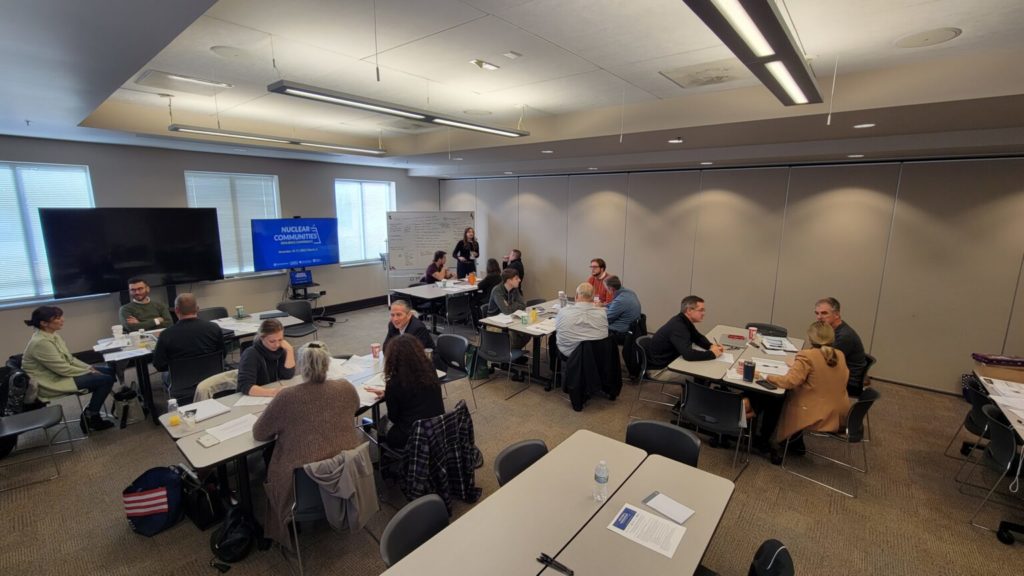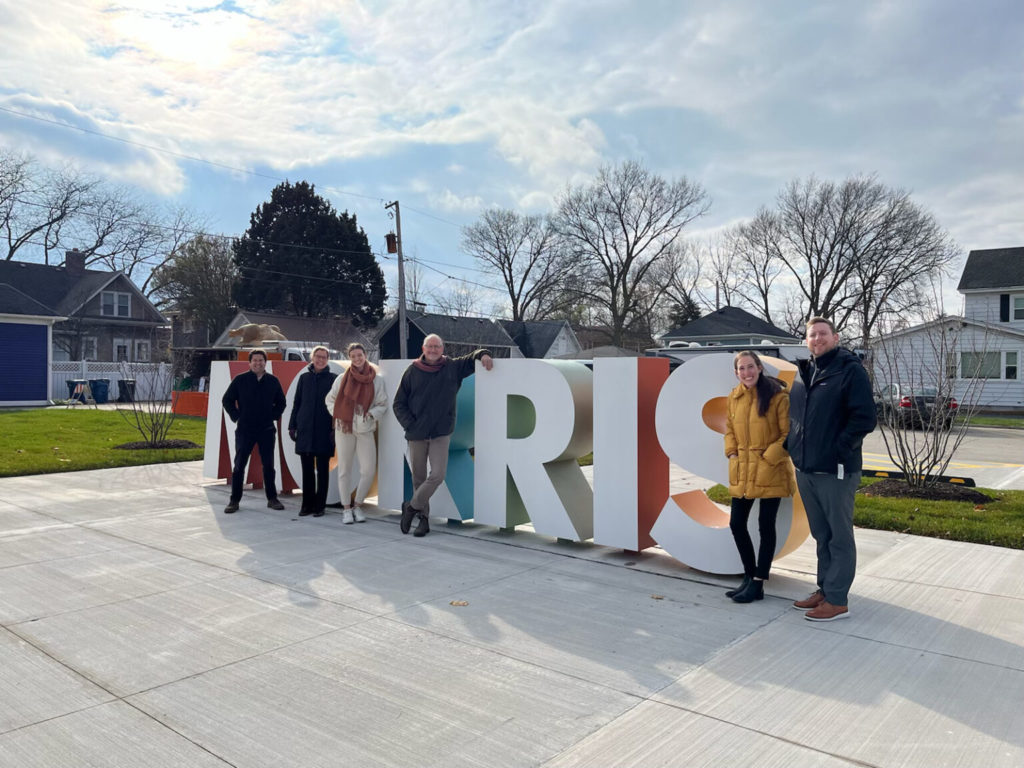In the Wake of Operational Uncertainty, Nuclear Host Communities are Planning for a Resilient Future
Guest Post from Megan Wright, Economic Development Associate, Smart Growth America. This post was originally featured here.

At the 2022 Nuclear Communities Economic Resilience Conference held November 16-17, host communities from nine nuclear plants in the Midwest – the region that hosts more than half of the nation’s nuclear fleet – gathered to share experiences, best practices, and plan for the future. The Nuclear Communities Team– a technical assistance group funded by the U.S. Economic Development Administration and led by Smart Growth America in partnership with the Nuclear Decommissioning Collaborative, the Center for Creative Land Recycling, and the National Association of Development Organizations Research Foundation, traveled to Morris, IL, a small town about an hour outside of Chicago, to convene representatives of nuclear host communities from across the Midwest.
What We Heard: Common Themes & Challenges
The conference was held in wake of renewed interest in nuclear power and its role in facilitating the nation’s transition to renewable energy. Midwestern states more than half of the nation’s nuclear fleet, with six active stations in Illinois alone. Participants recognized that energy transition and industry uncertainty is a reality and saw the value in preparing for a range of possible operating scenarios to bolster economic resilience. Throughout the event, the following themes surfaced:
Employment Contribution
Each nuclear host community and region is home to hundreds of nuclear plant workers and their families. For example, the Dresden nuclear plant provides Grundy County and adjacent communities in Illinois with approximately 800 full-time jobs; the Palisades nuclear plant provides 600 local jobs in rural Michigan. Both of these plants contribute hundreds of secondary and tertiary jobs to their respective regions. When a plant closes, many workers relocate, creating a sizable local and regional impact.
Socioeconomic Impact
Typically, the lifespan of a nuclear power plant is measured in decades, with the average operational life of a plant exceeding 40 years. Nuclear plants provide millions of dollars in taxes to local governments, often making up more than half of their total yearly budget. Some plants may also have a substantial impact on local school districts. For example, The Reed-Cook School District draws over 70% of its yearly budget from the Braidwood nuclear plant’s tax payments. Another economic impact of a plant on its host community is the wages it pays its workers. In Ottawa, IL, only 25 local residents work at the Dresden nuclear power plant, but they bring in a cumulative $2.5 million in wages to the community every year.
Volatility in the Energy Industry
It’s been difficult for host communities to know when their plant will close or understand how the decommissioning and closure process works. This uncertainty makes it challenging for a community to plan for their long-term economic health and makes planning intimidating as no one wants to think about their plant closing, and public opinion can vary greatly. Often, there is pushback against planning for the future if the public feels that planning for closure will encourage the utility to prematurely shut down a plant.
Capacity Issues
Small towns are just that: small. Their size is part of their charm and tight-knit community feel, but it also contributes to capacity issues. To that end, there is a clear need for economic development specialists in nuclear host communities to help them conduct economic impact analyses, complete grant applications, and assist in relationship-building with their plant operator. Nuclear power is a complex industry that often leaves communities in the dark when it comes to land assessments, tax valuations, and contract negotiations. Additionally, there is no standardized method for assessing the value of a nuclear power plant, resulting in community-specific tax agreements or litigation.
Regional development organizations can be key partners for local communities that need help writing grants and carrying them out, collecting data, and convening partners to support economic development planning efforts. For example, the North Central Illinois Council of Governments is serving as a project partner and grant administrator for an EDA-funded grant to the Grundy County Economic Development Council and the Grundy County Chamber of Commerce. The grant will help Grundy County develop and implement a resiliency and diversification strategy for the area.

Moving Forward: Opportunities & Planning for the Future
Although the impacts of energy transition and possible nuclear plant closure can be challenging for host communities, the closure of a plant doesn’t mean that a community no longer has a future. With the right planning and resources, there are many opportunities for host communities to have a leading role in planning their economic resilience and diversification to build continued economic prosperity. For example, one of the main opportunities that comes with plant closure is in the community’s existing workforce. This niche industry carries a unique set of skills that are highly marketable and can be used to attract other industries like engineering firms, medical technologies and equipment repair, and security operations. Additionally, funding opportunities for nuclear host communities, regardless of the stage of their plant’s operation, are available through legislation like the Infrastructure Reduction Act (IRA) on the national level and state-level programs such as the Climate and Equitable Jobs Act (CEJA) in Illinois. These grant programs can be used to support existing nuclear facilities, but also to invest in new nuclear technologies like small modular reactors (SMRs).
A common thread among participants at the conference was their love for their communities. Nuclear power plants forever change the community they are in, whether the plant is open, in the process of decommissioning, or permanently closed. To maintain the unique and wonderful elements in their communities, local leaders, the utility, and community members need to work together to ensure a sustainable, resilient ecosystem is constructed to economically support each nuclear host community for years to come.
To learn more about the resources to support nuclear host communities and training/technical assistance opportunities from the Nuclear Communities Team, click here.
Special thanks to Nancy Norton and Monica Schild from the Grundy County Economic Development Council, and Mayor Chris Brown of Morris, IL for generously hosting the Conference.
This work utilizes Federal funds under award ED20HDQ3030068 from the U.S. Economic Development Administration (EDA), U.S. Department of Commerce. The statements, findings, conclusions, and recommendations are those of the project team and do not necessarily reflect the view of the EDA or the U.S. Department of Commerce.

